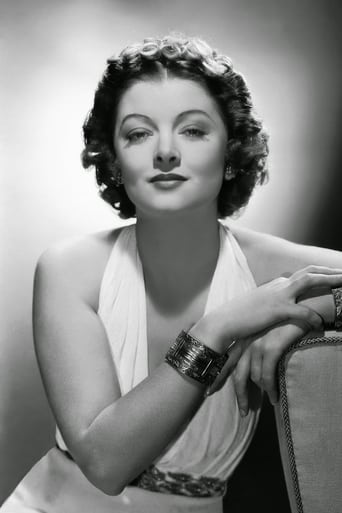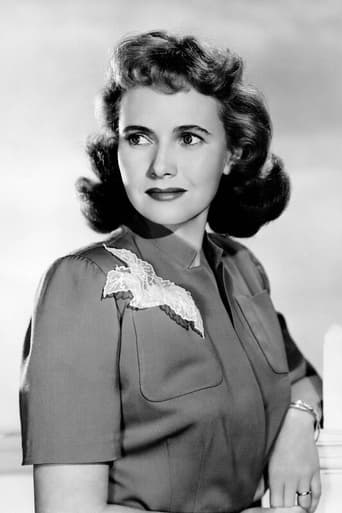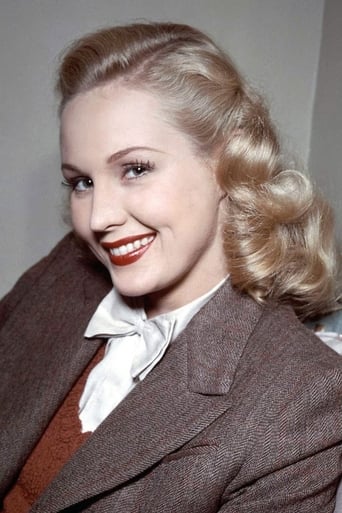ElMaruecan82
When Al Stephenson asks his children "You've changed, what happened?", "just four years of normal growth" says his daughter Peggy, kisses and joy ensue while this line is cooking in our head. Yes, one simple absence is liable to create shifts of misunderstanding even with your beloved ones. I have always said that besides love and respect, understanding was the underrated cement of relationships, "The Best years of Our Lives" explore that issue through the intertwined post-war lives of three WW2 veterans.Fredric March is Al, a forty-something banker who comes back unwounded but fails to recognize his home, Peggy (Teresa Wright) grew up and gained such maturity she became a mother's substitute and his son has long abandoned the war's patriotic scope for more sensitive questions about the use of the Nuclear force. The housewife (Myrna Loy) is overwhelmed by Al's come-back but you can feel the tension, when the heat is over, Al feels entrapped and needs to celebrate his comeback anywhere but out of the house. That "Going for a drink" excuse was subtly foreshadowed by the similar reluctance of Homer Parrish to meet his folks. Homer is perhaps the heart of the story, a sailor who lost his hands in duty but took it all in stride, minimizing the loss and being thanking the Navy for having taught him the use of his hooks. We're impressed by his ability to light a match and sign his name but as Al points out, they never taught him to take his fiancée in his arms and stroke her hair, though a better line could have been "they didn't teach the family to handle them".Homer's no fool, he notices her mother's sobbing gasp at the sight of the hooks and knows he's going to handle awkward guilt-driven demonstrations of love. As a result, he doesn't even talk about the marriage with his fiancée (Cathy O'Donnell) fearing she couldn't handle it, or maybe wishing she wouldn't. The irony of Homer, played with genuine intensity by Harold Russell, is that he doesn't want to be seen as a freak but is reminded of his handicap because he looks in people's eyes like in a mirror, or does he see his own reflection?And then there's Fred, Dana Andrews, he comes from a poorer neighborhood and his wife (Virginia Mayo) seemed to have left the house. She's obviously a "tramp" and soon the pride and exaltation of having a dashing husband in his uniform leads to the disillusion of unemployment. Once a respected and brave captain, Fred becomes a soda jerk, a loser in the eyes of society and his wife, for what it's worth. Fred finds the needed comfort in Peggy, she can see that he's unhappy in marriage, likewise in society.Now that the most prevalent war veteran figure is the Vietnam vet who saw his best friend being blown to pieces in Nam, here's 1946 Best Picture, directed by ace director William Wyler, and reminding us that post-war isn't just all about PTSD, shell shock and dark memories, there are physical and emotional scars, but perhaps the toughest part of the job is to try to adjust yourself to a world that changed, before you realize you're the one who changed. "Mudbound" handled that issue in 2017, and quite well."The Best Years of Our Lives" centers on these three men's lives and their families in the generic town of Boone City. Each man represents a side effect of the war. Although it would be tempting to treat their arcs separately, I like the way the three of them tie the plot together and rather than speaking different statements about a subject, make a positive message converging toward its heart-warming conclusion, after almost three hours of a journey into the everyday lives of normal citizens.And this is what impressed me the most in Wyler's tone, he doesn't go for any sensational effect, or overuse of pathos, there's no forced drama or twists, the film is long because it has a certain desire to build solid and realistic bonds. In any other movie, the romance between Teresa Wright and Dana Andrews would look phony and contrived but the first day is as long as the wedding in "The Godfather", you feel the realness of every interaction, and both Andrews or Wright seem to succumb to a relationship they wanted to resist first.The performances are so good I couldn't believe only March (who was splendid) and Russell were nominated, they won though, and Russell even won a second Oscar for his inspiration for WW veterans. But if you consider the whole cast, Myrna Low, Dana Andrews and Teresa Wright deserved nominations as well, but I guess they weren't because sometimes, the talent of an actor is enhanced by the directing, and the film owes a lot to William Wyler. It can ever be regarded as a school case of masterful directing.Indeed, what we take for great acting is sometimes a wonderful attention to details and characters behaving independently. In the Parrish' reunion scene, check how the father and then the mother has their first glimpses on Homer's hooks and try to ignore it. Another masterstroke is the phone booth scene, consisting on Homer playing piano with his Uncle (Hoagy Carmichael), Harry listening to them and Fred making a crucial phone call at that moment. Three actions compacted in one scene, meanwhile, many long moments dedicated to seemingly mundane trivialities, eating breakfast, dancing, drinking, working at the office.Wyler knows what deserves several minutes and what can be handled in one and each character is given enough time and substance. And you know why? Because the story is all about people trying to reinvent themselves, for that, we need to know a little about their background, about what they are, and what they want to be, the film looks simple, but it's far more complex, intellectually engaging. Not to mention 100% relevant today.
jacobs-greenwood
This Best Picture Oscar winning film about veterans returning home from World War II includes disabled Army veteran Harold Russell (in his screen debut), who received two Oscars (Best Supporting Actor and Honorary for bringing hope & courage to his fellow veterans) for his performance, the only time an actor has received two Oscars for the same performance.Producer Samuel Goldwyn's greatest success (and that's saying something!) is directed by William Wyler (of course) who also took home the gold, along with Best Actor Frederic March, Writing, Editing, and Musical Score (the Sound was nominated). The excellent cast includes Myrna Loy, Dana Andrews, Teresa Wright, Virginia Mayo, Cathy O'Donnell, Hoagy Carmichael, Gladys George, and Ray Collins. Added to the National Film Registry in 1989. #37 on AFI's 100 Greatest Movies list. #11 on AFI's 100 Most Inspiring Movies list.March, Andrews as Fred, and Russell as Homer have returned home from the war to discover changes in themselves and their loved ones. Loy plays March's wife, Wright his daughter; Mayo plays Fred's wife, George his stepmother; O'Donnell plays Homer's fiancée. Though initially they go their separate ways, the veterans find that they are able to relate to each other in ways that their families cannot.








